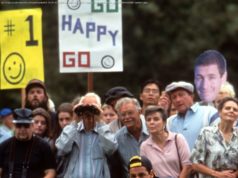If we’re disturbed by being reminded by Zac Efron’s performance in the Netflix movie
The glamorization of serial killers in films such as “Extremely Wicked, Shockingly Evil and Vile” are inherently brazen, because they draw on real-life suffering and death — and their goal is always to finesse those elements to engage an audience. It is as important therefore to ask which stories are worth retelling as it is to judge how well they are told. If a good-looking actor portraying a murderer known for flaunting his good looks is offensive — the inference being that superficiality is offensive — we would do well to be less superficial in our assessment of these films and their subject matter.
Another film about a killer, “Detainment,” which was up for Best Live Action Short Film at the Oscars (but lost to Guy Nattiv and Jaime Ray Newman’s “Skin”) told the true story of the murder of 3-year-old James Bulger near Liverpool, England, in 1993. His killers were two other children, 10-year-olds Robert Thompson and Jon Venables. The boys led James away from his mother in a shopping center, then across town to a railway track, where they tortured and beat him until he was dead.
Both Thompson and Venables were charged with abduction and murder as adults, because they were older than 10, the legal point at which a person in the United Kingdom assumes criminal responsibility for their actions. In 2010, Maggie Atkinson, the children’s commissioner for England, called for that age to be raised to 12. She said 10 was “too young,” in light of the Bulger case.
James’s mother, Denise Fergus, vehemently protested both the making and nomination of “Detainment,” which is based on real footage of interviews with Thompson and Venables in custody. The children are shown distressed as they answer police questions, eyes brimming with tears. They look far less sinister than Efron’s slick, measured Bundy, and the sympathy they provoke appeals to a far deeper instinct.
Vincent Lambe, who directed “Detainment,” argued that many missed the point of the film, and said in the run-up to the Oscars in January: “It’s to ask questions and to challenge the audience because I think we’ve got a responsibility to try and make sense of what happened.






